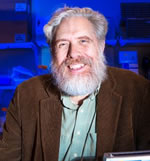 Given
the advances in biotechnology, it's just a matter of time before humanity
can bring the Neanderthals back from the dead. Whether we should is a
completely different story, according to genomics and synthetic biology
pioneer George Church of
Harvard University.
Given
the advances in biotechnology, it's just a matter of time before humanity
can bring the Neanderthals back from the dead. Whether we should is a
completely different story, according to genomics and synthetic biology
pioneer George Church of
Harvard University.In this intriguing interview with Der Spiegel, Church explained that using synthetic biology to bring the Neanderthals back from extinction may actually benefit society:
SPIEGEL: Wouldn't it be ethically problematic to create a Neanderthal just for the sake of scientific curiosity?But first, you'd need an "extremely adventurous female human" to serve as a surrogate mother:
Church: Well, curiosity may be part of it, but it's not the most important driving force. The main goal is to increase diversity. The one thing that is bad for society is low diversity. This is true for culture or evolution, for species and also for whole societies. If you become a monoculture, you are at great risk of perishing. Therefore the recreation of Neanderthals would be mainly a question of societal risk avoidance.
SPIEGEL: Setting aside all ethical doubts, do you believe it is technically possible to reproduce the Neanderthal?Read the full interview over at Der Spiegel
Church: The first thing you have to do is to sequence the Neanderthal genome, and that has actually been done. The next step would be to chop this genome up into, say, 10,000 chunks and then synthesize these. Finally, you would introduce these chunks into a human stem cell. If we do that often enough, then we would generate a stem cell line that would get closer and closer to the corresponding sequence of the Neanderthal. We developed the semi-automated procedure required to do that in my lab. Finally, we assemble all the chunks in a human stem cell, which would enable you to finally create a Neanderthal clone.
SPIEGEL: And the surrogates would be human, right? In your book you write that an "extremely adventurous female human" could serve as the surrogate mother.
Church: Yes. However, the prerequisite would, of course, be that human cloning is acceptable to society.

No comments:
Post a Comment